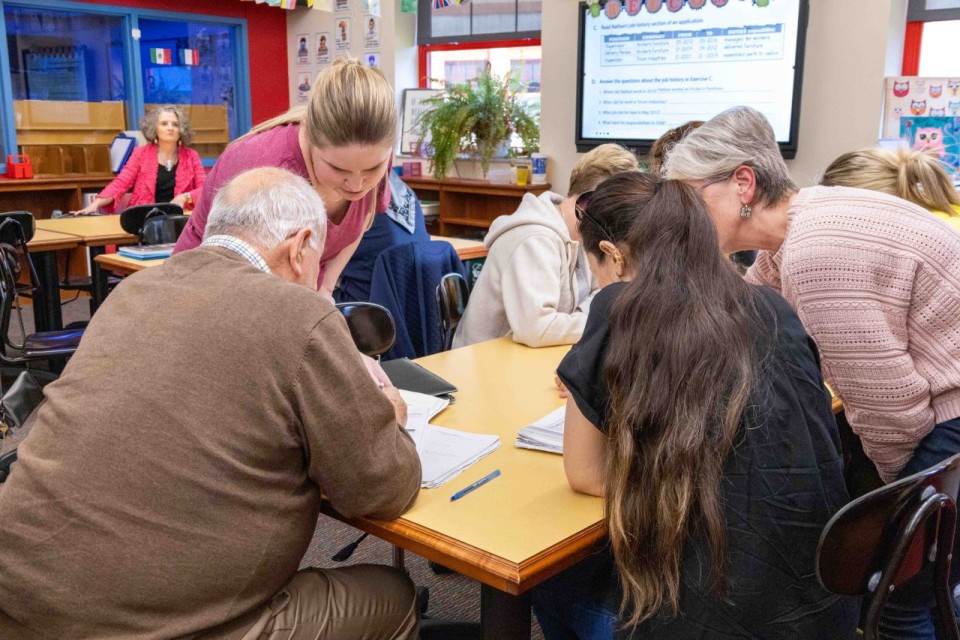
By Katy Critchfield
At Literacy Pittsburgh, almost a quarter of our English language learning students join the program as absolute beginners. Students at this level typically cannot speak or understand English beyond a few words or phrases. While our beginning-level students come from a wide range of linguistic and cultural backgrounds, some of these learners may also be unable to read or write in their first language, have limited formal education, or be starting from scratch with the English alphabet. As such, this group needs to build basic language skills that will enable them to confidently perform daily tasks like visiting the grocery store, communicating with their children's school, navigating public transportation, and attending medical appointments.
They may be working or looking for work, so workplace communication is also an essential skill to build. In addition to the linguistic barriers they face, beginning-level learners may face additional challenges, including lack of access to childcare, limited digital literacy, and unpredictable or long work hours. Nevertheless, these students consistently demonstrate an impressive and inspiring resilience and drive as they work to build a good life for themselves and their families here in Pittsburgh.
For our part, staff at Literacy Pittsburgh are continuously working to improve access to our English language programming for students at the beginning level, from their very first encounter with the organization. We are often able to make use of new technologies to achieve this goal. For example, our student sign-up form can now be viewed in over 100 languages thanks to online translation tools. And that’s just the beginning! After registering for the program, students are invited to attend an orientation and intake session. At this time, students learn more about the mission of Literacy Pittsburgh while they complete necessary paperwork and take a short English test. This testing enables us to place them in the right class and find the right learning materials for each student.
I spoke with Keerstan McGinley, our ELL Enrollment Coordinator, who leads these orientation sessions for English learners of all levels. Keerstan described the excitement that students express when they are getting started at Literacy Pittsburgh: “The most common question students have is when they can begin their courses! There is usually an urgency to start, and for very tangible reasons. The most common emotion is excitement. Students are ready to learn and start achieving their goals with us. Their energy is contagious.” When asked how she helps learners with very limited English navigate the intake and testing process, Keerstan explained “I couldn’t live without translation services like Google Translate and Tarjimly. I use them daily. I also find pulling up pictures of what I am saying helps those with lower literacy levels understand me. Sometimes a hiccup in Google Translate can be resolved instantly with one image search.” But the most important tool in Keerstan’s toolkit is empathy. She works consistently to meet students where they are, to anticipate their needs as much as possible, to put them at ease, and to make them feel welcome at Literacy Pittsburgh.
Once students have completed their orientation, our enrollment team begins looking for a learning placement for them. That may be an online or an in-person class, or a match with a volunteer tutor. Students at the beginning level are supported in learning basic grammar like the simple present, and simple vocabulary focused on skills like sharing personal information, following classroom instructions, and shopping for food and clothes. In their very first class, they are likely to learn how to introduce themselves and greet others. Not only does this make students feel welcome, it also helps them to begin building community with their classmates. If students need additional support with literacy skills, instructors and tutors work to identify their needs and to seek out supplemental resources like a classroom aide who can support them one-on-one.
Volunteer tutor Vicki Hegelson has worked with several beginning-level students, and she shared some of her experiences with me. In the first place, Vicki noted the challenges that some of her students have faced included working extremely long hours: “Personally, I can't imagine putting in a 10-hour day and then coming to tutoring to learn another language before I've even eaten dinner!” Vicki described how she learned to celebrate the small wins, and to pivot her lesson priorities and goals depending on her students’ needs. When asked what strategies or activities she finds most effective when working with beginning-level learners, Vicki emphasized that she prioritizes “giving them some ‘wins’. When the workbook gets hard and the student is frustrated, I get out the flash cards for colors, body parts, or foods and we play some games or practice vocabulary.” Reminding students of the progress they have made and giving them the opportunity to practice and review some of the things they have already learned is a great way to maintain their confidence and keep them motivated during their English language journey.
It may take months or even years for students working at this level to significantly increase their test scores, but the progress they make along the way extends far beyond the classroom. And with that progress, our English language learners build confidence, life skills, and community. For our students, we notice and celebrate moments of improved linguistic independence like being able to call and make a doctor’s appointment, or being able to send a note to a child’s teacher. Every new word or sentence structure they learn helps them with job readiness, connects them more fully with their communities, and brings them closer to achieving the goals that motivated them to walk through our doors in the first place. In turn, as learners gain new and improved language skills, they become more active participants in their neighborhoods, workplaces, and schools, making the entire Pittsburgh community stronger, one word at a time.
Literacy Pittsburgh (formerly Greater Pittsburgh Literacy Council) helps create better lives through learning. Recognized as a national leader in adult and family literacy, Literacy Pittsburgh is the largest provider of adult basic education in Allegheny and Beaver Counties. Last year, Literacy Pittsburgh helped more than 4,000 individuals acquire the skills needed to reach their fullest potential in life and participate productively in their communities. Literacy Pittsburgh provides free, personalized instruction in workforce readiness, high school diploma test preparation, digital literacy, English language learning, math, reading, and family literacy through one-to-one and small class instruction. Founded in 1982, it serves local adults through numerous neighborhood locations and its Downtown Pittsburgh Learning Center.


